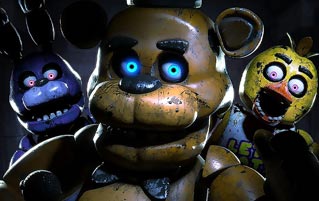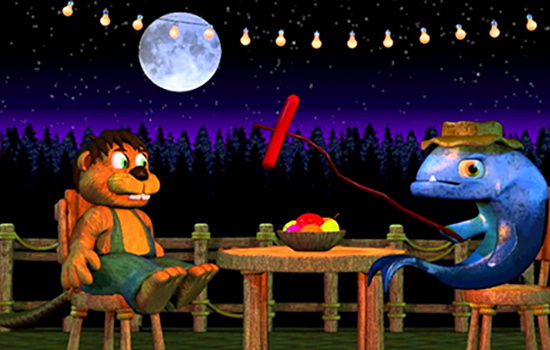Behind The Scenes Stories Of Huge Video Games

Ambitious creative projects can be plagued by all sorts of ailments ranging from studio interference to hurricane interference. But there are always problems and issues that you won't suspect, ones that you couldn't possibly think to consider when you sign on. And in the world of video games, these can change the course of production immeasurably.
Nier Automata's Director Hated Waking Up Early
Nier Automata, a 2017 action RPG about a rad combat android, sold millions of copies and was beloved by critics, too. It also saved gamers the trouble of creating their own erotic fanart of the protagonists, so, ya know, win-win-win. The game was the brainchild of developer Yoko Taro, who'd made his name on the Drakengard franchise (which the Nier games spun off from.) And despite his prior success, all of Taro's previous achievements pale in comparison to Nier Automata, a project he almost gave up on because of his sleeping schedule.
Look, game development is often plagued by overlong hours that prevent developers from sleeping enough, but that's not really the case here. Taro just didn't want to wake up early, which was problematic because it prevented him from working with the rest of the team for a big chunk of the day. Taro defended his position that starting a workday at the deathly early hour of, umm, 9:30 AM as a freelancer is impossible, and this caused constant arguments among his team.
In an interview, Taro stated he considered straight up just canceling the game because of his sleeping schedule. And before anyone pulled the "Oh, Taro. You're a famous game developer. You must be joking. I bet you don't even sleep at all!" card, he clarified that he was dead serious.
The game ended up getting made, indicating that Taro got his act together and started waking up when his mates needed him, right? Wrong. Taro just got the company to give up and allow him to get into work, not merely at a later time, but whenever he would finally wake up.
Five Nights At Freddy's Happened Because Of A Bad Line In A Review
Five Nights at Freddy's was the surprise horror hit of 2014, replacing zombie and ghosts of old with haunted animatronic figures capable of terrifying anyone below the age of 13. But despite being a commercial success and spawning several hit sequels in a short amount of time, the tale of FNAF is full of despair. Scott Cawthon was in the very hardcore business of Christian games until game journalist Jim Sterling shared some harsh opinions on a game by Cawthon called Chipper and Sons Lumber Co.

In his scathing video commentary, Sterling noted how the the supposed-to-be welcoming characters in Chipper Co. unintentionally had "dead terrifying soulless eyes," before realizing that hell, everything else in the game looked terrifying, too. The words took a toll on Cawthon, who later realized that, like any great supervillain origin story, he could use his skills to make something intentionally scary.
And truth be told... he didn't. The animatronic beasts from the FNAF series are scary on their own and the atmosphere of the games certainly helps, but nothing is more frightening than a monstrosity intended to be adorable. Still, by pivoting to horror and working with some neat new mechanics, Cawthon got a deservedly huge following. Great to see he managed to revive his career by simply switching genres in a way that made him and everyone happy. Well, except for Jesus apparently, as Cawthon's Christian followers have seriously debated whether or not he's sold his soul.
Dark Souls Is The Result Of Reanimating A Video Game Corpse
Demon's Souls is what got the ball rolling for the "Souls" genre, the biggest thing in the 2010s gaming scene if you don't count Fortnite and online harassment. Hidetaka Miyazaki, the game's creator, was a 30-year-old social studies graduate when he started coding for From Software, and he managed to convince the company to let him work on Demon's Souls. The big wigs gave him the reins of the project, which might seem like some proof of Miyazaki's advanced social manipulation skills, but that's not it, or at least not all there was to it. It's because Demon's Souls was a dead-on-the-water project no one wanted anything to do with.
The development had been a mess, and the team had failed to create a solid prototype. They only told Miyazaki to do whatever he wanted with the project because it couldn't possibly get worse than being a total failure, which it already was. Miyazaki introduced so many original mechanics that the completed Demon's Souls had nothing other than a name in common with the project he'd picked up, and the rest was history. And on top of its various revolutionary mechanics, there's another remarkable aspect about the Souls games that came about because of hardship: Its storytelling.
The storytelling in the Souls games can be described as obtuse, and that's by design. Young Miyazaki used to read books in English when he didn't have a good grasp of the language, so he replaced words he didn't understand with familiar ones. Miyazaki has since repurposed his childhood experiences into a type of storytelling that's deliberately incomplete. By making players fill in the gaps with their imagination, Miyazaki makes them feel they are co-authoring a story and gets the perfect excuse for not creating a cohesive narrative.
Silent Hill Exists Because Of A Failed Attempt At Failing
For making Silent Hill, the best horror series in video game history, its developers earned the awesome name of "Team Silent". Pretty neat, but originally they were just a bunch of people Konami had no clue what to do with. The team first met in a room paved by very thin ice where Konami put developers coming from failed projects. In the wake of Capcom's Resident Evil, everyone was trying to ape the survival horror genre, so Konami tasked their in-house group of rejects to scare gamers into giving them money.
Unlike most troubled development stories, upper interference wasn't at play here. Konami didn't actually care about Silent Hill, as this simply about selling a game, not about making a game worth selling. Team Silent felt so free they thought Konami had forgotten about them. Weirdly, most of Silent Hill's chaotic development spawned from internal disagreements.
The original game was directed by Keiichiro Toyama, a man who successfully created a Lynchian nightmare despite having no previous experience directing. And that's the least strange of the bunch.
Akira Yamaoka, the now legendary composer renowned for the game's iconic soundtrack, only joined the team because the previous composer had called quits. Yamaoka's ideas for an industrial score were so brazen that others thought they were too horrifying. He eventually got them to cave in through what I assume was a completely legal use of noise torture.
Another remarkable aspect of the games is its beautiful yet creepy cutscenes. They were all made by one man, Takayoshi Sato. He had no serious 3D modeling experience and had to convince the team that videos were actually important for the narrative. He failed, so for 3 years, he didn't go home because he had to render the videos at night when the computers weren't being used for anything else.
The success of the Silent Hill series is the result of a perfect storm of madness, and Konami probably feels blessed they kept Team Silent. Just kidding, Konami disbanded Team Silent and outsourced the development of every game after Silent Hill 4, effectively destroying the series.
Red Dead Redemption Owes Its Life To Ringo Starr
Red Dead Redemption 2 made headlines for the terrible working conditions Rockstar Games imposed on its dev team. That's terrible, but while RDR2 might have shown Rockstar at its worst when it came to dealing with workers' rights, it didn't show Rockstar at its weirdest. The success of every prior game in the Red Dead series was the result of a bizarre chain of events.
Before the series hit the critical and commercial stratosphere with Red Dead Redemption, there was SWAT, short for "Spaghetti Western Action Title." SWAT wasn't even a Rockstar game at first, but a Capcom game. And why were they trying to make a Western? Because one of the big shots at Capcom had just got inexplicably starstruck after watching a Western film starring legendary genre actor Clint Ea..Ringo Starr, duh.
The levels of passive-aggressiveness during development were high to the point that characters were all spoofs of members of the dev team. Eventually, after floundering around with the project, Capcom just gave it away to Rockstar in exchange for the publishing rights in Japan, despite not believing it would ever actually get published anywhere. The final product was eventually called Red Dead Revolver, a game so average it's the main reason the sequel has the word "Redemption" in its title.
Red Dead Redemption did turn out great for the most part, but its development wasn't any less of a mess. An unnamed source claims gross mismanagement made sure the game was a disaster up until just a few months before its release. Wow, a whole few months? In the video game industry, that kinda seems like a slam dunk.